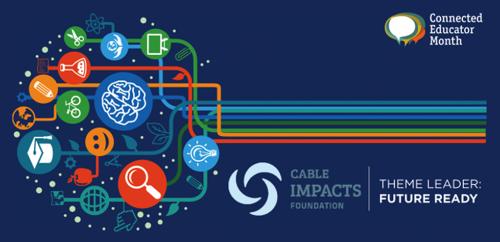Change is easier, and often more effective, when it’s done with you rather than to you. Many times in the past, education reform has come from the top down, without teachers having a voice.
We’ll never get “future ready” schools without the active involvement of educators in all aspects of the process. At Cable Impacts Foundation, when we embarked on the project to create “Building Your Roadmap for 21st Century Learning Environments,” a tool education leaders could use to map out and manage transforming their schools into technology-rich hubs of personalized digital learning and 21st century teaching, we involved teachers from the beginning. Their voices defined the teaching component of the Roadmap. The voice of teachers played a key role in constructing the Future Ready Schools initiative, as well.
So what do teachers think is most needed for creating a “future ready” school? Since 2003, the Speak Up Research Project has been asking students and teachers that kind of question. Julie Evans, CEO of Project Tomorrow, the organization that runs the Speak Up Project summarizes what the teacher survey data tells us.
Teachers have a unique perspective on what is working, what is not working and what other things should be done to improve their effectiveness and impact student learning. They see four things that are vital for creating a future ready school.
First, teachers realize that they need professional development but the traditional in-service methods just don’t work anymore. Educators want PD that is highly personalized to their strengths and weaknesses, contextualized to be relevant to their curriculum, and timely – providing just the right amount of coaching and mentoring exactly when they need it.
Second, teachers value opportunities to collaborate and learn from each other. Increasingly, that’s being done through social media tools and online communities that become their “home team” of colleagues and coaches with whom they can share advice and support.
Third, teachers want to be at the table when digital tools are being evaluated and selected for classroom use. In many schools and districts, the decisions about and investments in online curriculum, digital content licenses, e-textbooks and even what websites can be used with students are being made by individuals several steps removed from the classroom. Administrators look first for digital content that is research based while teachers seek products that are created or evaluated by other teachers, and that they can modify or customize.
Fourth, teachers want their administrators to be authentic, co-learners with them on the journey to creating future-ready schools. Educators want to have confidence that their leaders truly understand the challenges they face, that they have a personal understanding of a new classroom models, and that they will provide the supports necessary for teachers to build capacity.
In the Roadmap project, teachers gave us great insight into what was needed and the best ways to deliver resources and PD to meet those needs. Too often school reform has failed, in part because teachers weren’t an integral part of the process. With the fast-paced, constantly evolving, globally economy, complex civic and social spaces, change is a given. We can’t afford to ignore the voices of teachers.
This blog was originally posted on October 28th, 2015 as part of Connected Educators Month.
